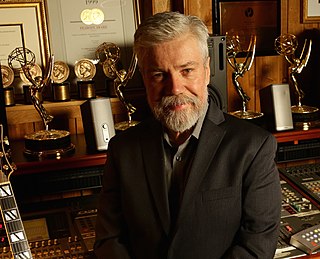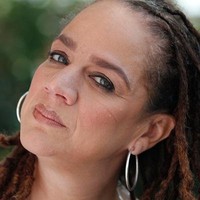Related Research Articles
Frontline is an investigative documentary program distributed by the Public Broadcasting Service (PBS) in the United States. Episodes are produced at WGBH in Boston, Massachusetts. The series has covered a variety of domestic and international issues, including terrorism, elections, environmental disasters, and other sociopolitical issues. Since its debut in 1983, Frontline has aired in the U.S. for 42 seasons, and has won critical acclaim and awards in broadcast journalism. In 2024, Frontline won its first Oscar at the 96th Academy Awards for Best Documentary Feature, 20 Days in Mariupol, made by a team of AP Ukrainian journalists. Frontline has produced over 800 documentaries from both in-house and independent filmmakers, 200 of which are available online.

The Donner Party, sometimes called the Donner–Reed Party, were a group of American pioneers who migrated to California in a wagon train from the Midwest. Delayed by a multitude of mishaps, they spent the winter of 1846–1847 snowbound in the Sierra Nevada. Some of the migrants resorted to cannibalism to survive, mainly eating the bodies of those who had succumbed to starvation, sickness, or extreme cold, but in one case two Native American guides were murdered for this purpose.
Nova is an American popular science television program produced by WGBH in Boston, Massachusetts, since 1974. It is broadcast on PBS in the United States, and in more than 100 other countries. The program has won many major television awards.
The Alfred I. duPont–Columbia University Award honors excellence in broadcast and digital journalism in the public service and is considered one of the most prestigious awards in journalism. The awards were established in 1942 and administered until 1967 by Washington and Lee University's O. W. Riegel, Curator and Head of the Department of Journalism and Communications. Since 1968 they have been administered by the Columbia University Graduate School of Journalism in New York City, and are considered by some to be the broadcast equivalent of the Pulitzer Prize, another program administered by Columbia University.

The Civil War is a 1990 American television documentary miniseries created by Ken Burns about the American Civil War. It was the first broadcast to air on PBS for five consecutive nights, from September 23 to 27, 1990.

Geoffrey Champion Ward is an American editor, author, historian and writer of scripts for American history documentaries for public television. He is the author or co-author of 19 books, including 10 companion books to the documentaries he has written. He is the winner of seven Emmy Awards.
Rory O'Connor is a journalist, author, educator, and documentary filmmaker. He is co-founder and president of the Globalvision Corporation, and board chair of the Global Center, an affiliated non-profit foundation. His films and television programs have aired on PBS, BBC, NHK, CBS, NBC, ABC, Fox, and numerous other networks. He has been involved in the production of more than two dozen documentaries, and his broadcast, film and print work has been honored with a George Polk Award, a Writer's Guild Award for Outstanding Documentary, an Orwell Award and two Emmys. He has written several books and blogs for the Huffington Post, AlterNet, Al Jazeera and other news sources.
Thomas Furneaux Lennon is a documentary filmmaker. He was born in Washington, D.C., graduated from Phillips Exeter Academy in 1968 and Yale University in 1973.

Ric Burns is an American documentary filmmaker and writer. He has written, directed and produced historical documentaries since the 1990s, beginning with his collaboration on the celebrated PBS series The Civil War (1990), which he produced with his older brother Ken Burns and wrote with Geoffrey Ward.

Martyn Burke is a Canadian director, novelist and screenwriter from Toronto, Ontario.

Brian Keane is an American composer, music producer, and guitarist. Keane has been described as "a musician's musician, a composer's composer, and one of the most talented producers of a generation" by Billboard magazine.
Steeplechase Films is a documentary production company founded in 1989 by filmmaker Ric Burns. They produce films focusing on events and people in American history, mainly for the PBS series American Experience. Ric and his company are best known for the eight-part, seventeen-and-a-half-hour series, New York: A Documentary Film, which premiered nationally on PBS to wide public and critical acclaim when broadcast in three installments in November 1999, September 2001, and September 2003.
Jeanne Jordan is an American independent director, producer and editor. She was nominated for an Academy Award and has received the Grand Jury Prize at the Sundance Film Festival among many other awards.
Coney Island is a 1991 documentary film that traces the history of Coney Island, the westernmost part of the barrier islands of Long Island, New York. The film covers the island's 1609 discovery by Henry Hudson, its 1870s incarnation as a respectable beach destination for city-dwellers and a showcase of the new developments ushered in by the machine age, the early 20th century, when amusement parks and innovative attractions attracted hundreds of thousands of people each day, and the gradual demise of the amusements.
Stephen Ives is an American documentary film director and original founder of Insignia Films. Among his productions are The West (1996), Reporting America at War (2003), Roads to Memphis (2010), and Grand Coulee Dam (2012), and the four-part series Constitution USA (2013) which aired on PBS in the summer of 2013. PBS broadcast his most recent aired work, The Great War, in three parts (2017).
My Lai is a documentary film detailing the My Lai massacre. It aired as an episode of American Experience on PBS.
Marion "Muffie" Meyer is an American director, whose productions include documentaries, theatrical features, television series and children’s films. Films that she directed are the recipients of two Emmy Awards, CINE Golden Eagles, the Japan Prize, Christopher Awards, the Freddie Award, the Columbia-DuPont, and the Peabody Awards. Her work has been selected for festivals in Japan, Greece, London, Edinburgh, Cannes, Toronto, Chicago and New York, and she has been twice nominated by the Directors Guild of America.
Elizabeth Deane is a writer, producer and director of documentary films for PBS, specializing in American history. She is based primarily at WGBH-TV in Boston, with work ranging from presidential politics to biographies and musical history.

Jacquie Jones was an American public television film director, producer, writer and media executive. She was an editor of the Black Film Review from 1989 to 1993. She was executive director of Black Public Media from 2005 to 2014.
Truman is a 1997 two-part television documentary film about Harry S. Truman, the 33rd President of the United States. Produced by PBS for The American Experience documentary program, it recounts Truman's life from childhood to his presidency. Written, co-produced, and directed by David Grubin, the film first aired on PBS in two parts on October 5 and 6, 1997.
References
- ↑ "Short Takes". Time . November 2, 1992. Archived from the original on August 12, 2010.
- ↑ "?". Los Angeles Times. October 19, 1992.
- ↑ "Donner Party: American Experience". Peabody Award. 2010.
- ↑ "D. W. Griffith Award of the National Board of Review for the Best Television Program". RicBurns.com. 1992. Archived from the original on 2011-05-27.
- ↑ "Broadcast Awards: American Experience". PBS. WGBH. Archived from the original on 2016-03-04. Retrieved 2017-09-15.